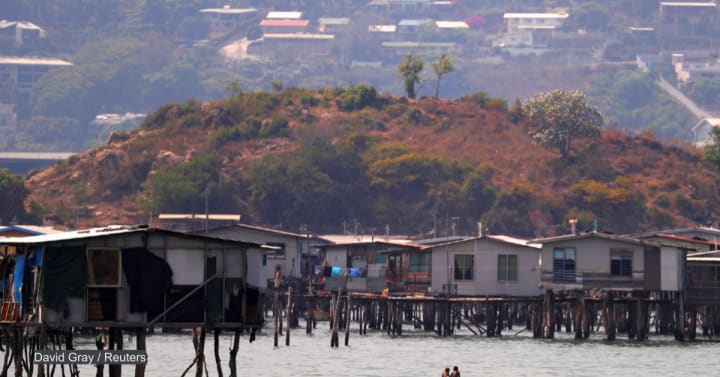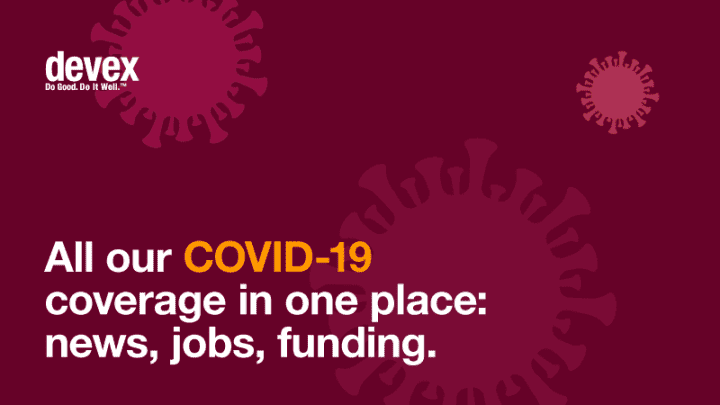
According to official statistics, there have been just over 7,000 confirmed cases of COVID-19 in Papua New Guinea as of April 4. But experts on the ground believe the actual number is closer to 100,000 — with the possibility of a total of 1 million people being infected in the coming weeks.
PNG Epidemic Response Group, an alliance of medical research institutes, Australian churches, professional services, and development and humanitarian organizations operating in PNG, issued the warning on April 1 as they saw hospital and health care services exceed capacity and a large proportion of health care workers confirmed to have contracted COVID-19.
Dr. Moses Laman, deputy director of science and research at Papua New Guinea Institute of Medical Research, confirmed to Devex that 100,000 cases would be “closer to reality.” “When you look at the proportions coming in for testing, currently 1 in 5 of the tests are positive,” he said. “That tells us there is widespread community transmission.”
The unknowns surrounding COVID-19 in PNG create more risks — a PNG variant has already been detected. There is concern that continuing transmission could lead to more variants that could risk the effectiveness of vaccines.
With the country so far behind in detecting the spread, PNG has entered a one-month lockdown. There are plans to increase testing using rapid antigen-testing kits, initially meant to be delivered by the World Health Organization last year. “This is not going to help,” Laman said. “The numbers will still be lower than expected because testing has been low for some time.”
With lack of data, sources of the spread are unknown
In November, the PNG government insisted that the country had escaped the brunt of COVID-19. “PNG has been spared from the worst health impacts of COVID-19,” said Ian Ling-Stuckey, Department of Treasury minister, in his budget speech. “There were grave fears for a massive outbreak in PNG. While we must not become lazy in dealing with COVID-19, the reality is that it has not directly hit our people as much as feared.”
Closing international borders and other “wise management,” Ling-Stuckey said, had spared PNG from the worst health impacts. But borders were not fully closed. Exemptions were in place for fly-in fly-out workers in extractive industries, with new quarantine measures introduced in October following concern of spread.
“In the provinces, it’s almost impossible to tell what’s going on because there has been virtually no testing throughout last year and even now.”
— Mimi Zilliacus, CEO, Australian Doctors InternationalDespite health concerns, extractive industries contributed 10% of government revenue, 29% of gross domestic product, and 89% of the country’s total export value in 2018, according to the Extractive Industries Transparency Initiative. They continue to be essential to PNG’s economic recovery. Economic reliance on mining could have seen the coronavirus enter undetected.
A relatively young population may also be a factor. The median age of PNG was 22.4 years old in 2020, and asymptomatic spread amongst this demographic could have seen transmission occur undetected. Understanding how long COVID-19 has been in the community and how it has spread is a challenge because data just does not exist — especially for regional locations where 87% of the population reside according to 2019 data,
“In the provinces, it’s almost impossible to tell what’s going on because there has been virtually no testing throughout last year and even now,” Mimi Zilliacus, CEO at Australian Doctors International, told Devex. “Lots of provincial governments have been reluctant to act, even when the response from the central government has ramped up. This is because so much misinformation has been spread, even amongst senior government officials.”
Broken messaging has led to a lack of data and misinformation
Clear and consistent messaging is an important component in an effective health response, Simon Eccleshall, head of programs at Médecins Sans Frontières’ Australia office, told Devex. But this is something he says has not been seen in PNG.
“We’re not really seeing this education and enforcement around social distancing practices that we do in countries where we are successfully containing COVID outbreaks,” he said.
Get development's most important headlines in your inbox every day.
Thanks for subscribing!
Misinformation in PNG about the existence of COVID-19, treatments, and vaccines have spread in PNG, which according to Laman, is impacting the response. A divide between the central PNG government and provincial governments in communication and messaging increases the challenge.
Zilliacus said confirmed cases and deaths are not conveyed from provinces to the national government, while communication and supplies have also been slow in delivery vice versa. “I have been in meetings where they have said, ‘there is enough PPE in the country, it is all out there.’ Myself and other NGOs are pointing out that the reality is that there are provinces that have none.”
The role of politics and a weakened health system
PNG politics has also played a role over the past year, potentially distracting the government from a focused health response. In June 2020, the coalition government split, and in October further Cabinet reshuffles aimed at solidifying leadership under Prime Minister James Marape. This reshuffle saw Jelta Wong — previously a shipping operations manager who came into the role two months before COVID-19 first emerged — removed as health minister before returning to the position a month later.
In a webinar with the Lowy Institute, Wong blamed PNG’s complacency for this shift.
In Brief: COVID-19 situation in PNG is worse than official numbers suggest
WHO and Australia's DFAT believe there is widespread community transmission of COVID-19 in Papua New Guinea, with official numbers not showing the full extent of the pandemic.
“At the end of last year, I was moved from the health ministry because we had low numbers,” he said. “We became complacent, and people started to think that because we weren’t getting COVID-19 in Papua New Guinea, we were never going to get it. So they moved me to civil aviation.” Wong said rising numbers saw him quickly re-appointed to the role.
The public response to early emerging cases resulted in lockdowns for PNG. Laman said the government faced a hostile public and was trying to avoid a repeat.
“Last year when we had lockdowns, there was not a large burden of COVID in the country in terms of numbers,” he said. “Some of the restrictions that came with police and military implementation saw mistreatment of people in the informal sector and markets. A lot of people voiced concerns about this lockdown.”
Even now, he said, despite a lockdown in place, there is no clear communication of what will happen in the coming weeks or whether further restrictions are planned for fear of a negative response.
All of this has combined with a health system that was already weak. In May 2020, provincial health systems were reporting underfunding and lack of staff. But the urgent response needed to support health systems was not seen.
Within PNG, the total 2021 budget health spending decreased from 10.4% to 8.9%. And Eccleshall said Australia, which provides 68% of PNG’s development assistance, pledges to provide a range of COVID-19 support, including vaccines and health system strengthening.
“We have failed to see the plan for the Pacific and where the money is going to be spent — including for health system strengthening in PNG,” he said.
For WHO, all of these elements are creating a situation of concern.
“The number of cases and deaths is important, but also are the details on where these cases are occurring and other characteristics,” a WHO spokesperson told Devex. “The ability of the existing in-country health systems to cope would also go into assessing response needs and also compliance to recommended interventions. These and other factors have been guiding WHO assistance to PNG intending to reduce mortality and morbidity and bring the pandemic under control.”

Printing articles to share with others is a breach of our terms and conditions and copyright policy. Please use the sharing options on the left side of the article. Devex Pro subscribers may share up to 10 articles per month using the Pro share tool ( ).
"behind" - Google News
April 06, 2021 at 05:57PM
https://ift.tt/3rVkBX4
Behind Papua New Guinea's rising COVID-19 cases lie misinformation and politics - Devex
"behind" - Google News
https://ift.tt/2YqUhZP
https://ift.tt/2yko4c8
Bagikan Berita Ini














0 Response to "Behind Papua New Guinea's rising COVID-19 cases lie misinformation and politics - Devex"
Post a Comment